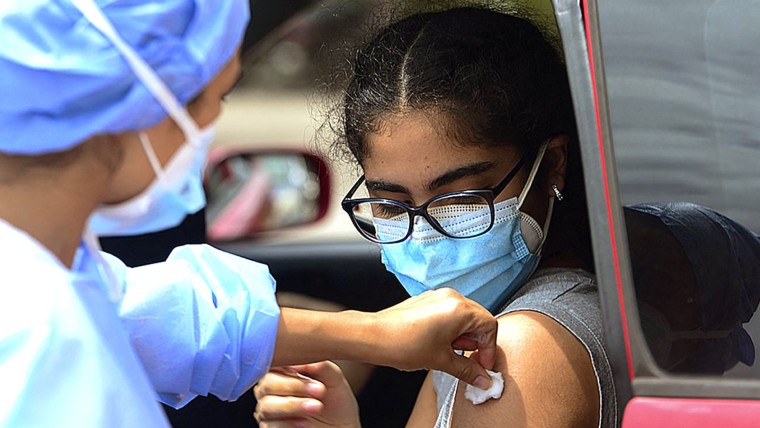With the unfold of the omicron variant and COVID-19 boosters open to these within the U.S. ages 16 and up, some are questioning what the long run holds for boosters. Will we additionally want a fourth dose, as Pfizer CEO Albert Bourla suggested recently? Ought to we be ready to get boosters for the following few years till COVID-19 is totally below management? Or will we’d like an annual shot, just like the flu vaccine, for the remainder of our lives?
Proper now, consultants do not know what number of COVID-19 boosters we’ll ultimately want or how continuously we’ll must get them. However there are some key components that they are being attentive to as a way to determine that out.
Boosters may provide longer-lasting protection
Boosters are designed to do precisely that — to spice up your physique’s preliminary response to a vaccine and supply extra safety in opposition to a specific pathogen. And it’s not that uncommon for a vaccine aimed toward stopping a viral sickness to require boosters, Dr. Bernard Camins, medical director for an infection prevention on the Mount Sinai Well being System, informed TODAY, pointing to the two-dose childhood measles, mumps and rubella vaccine. “On this scenario, we’re discovering out that even with the COVID-19 vaccines, you do want boosters,” he mentioned.”
Researchers are taking a look at two main components that may decide whether or not or not we’ll ultimately want extra boosters. First, does the safety supplied by the vaccines wane over time? And second, are the present COVID-19 vaccines nonetheless comparatively properly matched to the model of the virus that’s circulating proper now?
If the safety dissipates over time, as gave the impression to be the case with the preliminary two-shot doses, then we’d ultimately want one other spherical of boosters to amp up our immune responses.
“After six months, Moderna and Pfizer immunity wanes. And the thought behind boosters is strictly that phrase: Let’s give your immunity a raise and get these antibody and different responses again as much as a degree that’s extra protecting,” Dr. Gabor Kelen, professor and chair of the division of emergency medication at Johns Hopkins College, informed TODAY.
As that immunity waned and the delta variant took over, we noticed extra breakthrough infections amongst vaccinated individuals. (Though the charges of hospitalization and loss of life resulting from COVID-19 remained very low amongst vaccinated individuals.)
“The massive query now with the Moderna and Pfizer vaccines is whether or not this third dose goes to supply longer-lasting immunity or if that is one thing the place we’ll want booster pictures periodically,” Dr. Thaddeus Stappenbeck, chair of the division of irritation and immunity on the Cleveland Clinic Lerner Analysis Institute, informed TODAY. “That I do not suppose we have now the reply to but.”
Future booster shots may be targeted to specific variants
If a coronavirus variant emerges that seems to considerably evade the safety we have now from present vaccines, a brand new booster could be required to account for that. And future COVID-19 boosters could goal particular coronavirus variants.
“There was some mismatch between the vaccine and the delta variant, nevertheless it wasn’t dramatic sufficient to make the vaccine ineffective,” Camins defined. “With omicron, there’s really extra mismatch.”
Preliminary information released last week means that three doses of the Pfizer-BioNTech COVID-19 vaccine produce a protecting immune response in opposition to the omicron variant that’s comparable to 2 doses of the Pfizer vaccine in opposition to earlier variants. However the outcomes from a lab examine (shared in a press release) additionally present that those that obtained solely the first two-dose collection have a big discount in protecting antibodies in comparison with those that additionally obtained a booster dose.
These findings will must be replicated with real-world information earlier than consultants could make any conclusions concerning the effectiveness of Pfizer’s vaccine in opposition to omicron — or whether or not or not a wholly new COVID-19 vaccine is critical.
Each Pfizer and Moderna already introduced they’re engaged on omicron-specific variations of their vaccines and count on them to be prepared in March 2022, ought to they be wanted. “If it’s extra focused, you’re in all probability going to see fewer breakthrough infections with that booster,” Camins mentioned.
For now, “the entire vaccines are the unique selection,” Kelen mentioned. If omicron does not find yourself being any extra harmful or deadly than earlier variants, we could not essentially want a brand new vaccine.
“Should you put all of your eggs in omicron, by the point you get that (vaccine) out six months later we’ll have (one other variant),” Kelen mentioned. “So so long as the vaccines work moderately properly for any variant that comes alongside, you would not essentially want a newly produced, very directed vaccine.”
However there could come a time when a brand new variant “actually does keep away from or escape” the immune safety supplied by the vaccines, Kelen mentioned. And at that time, a brand new model of the vaccines will probably be obligatory.
Will we need a COVID-19 vaccine every year?
For now, consultants say it is too early to inform whether or not or not we’ll want extra boosters or for a way lengthy we must always count on to obtain them.
Many consultants anticipate that COVID-19 boosters will find yourself being like your yearly flu vaccine, Kelen mentioned, including that we could someday have an annual mixed flu and COVID-19 vaccine. (In actual fact, Moderna is already engaged on it, Reuters reported.)
“The inhabitants within the U.S. and plenty of nations is simply not prepared to get to the extent of herd immunity,” he defined. So we’ll seemingly be coping with the coronavirus in some kind or one other for the remainder of our lives with totally different variants “swirling round.” However whether or not or not meaning we’ll additionally must get boosters yearly for the remainder of our lives is not recognized but.
To find out whether or not or not one other dose is required for omicron, “what we’ll should do is simply monitor breakthrough infections,” Stappenbeck mentioned. If we begin to see an increasing number of of these past what researchers would count on, “the choice will probably be made to think about a fourth dose. And I feel that will be completely cheap,” he mentioned.
“I feel it could be someplace in between,” Camins mentioned. “Six months from now, it could be that we’ll want it once more. However I do not know if it is going to be lifelong just like the flu vaccine.” Finally, the extra individuals who stay unvaccinated the extra seemingly it’s that extra circumstances and, probably, more variants will emerge that necessitate added boosters, he defined.
And if you have not gotten your preliminary collection or third dose but, consultants say you should not let the potential for extra boosters dissuade you from getting this one now. Not solely does the booster considerably improve your safety from COVID-19 an infection, nevertheless it additionally makes you much less prone to transmit the virus to others, Kelen mentioned. “So it is each to your personal safety and so that you can defend different individuals as properly.”









